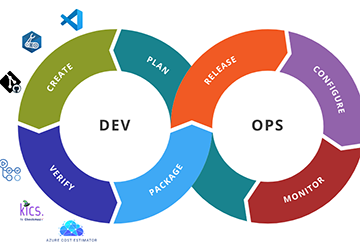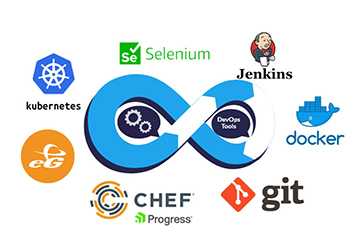In today's fast-paced tech environment, the Introduction to DevOps can feel like being introduced to a concept that has already revolutionized industries. DevOps merges development (Dev) and operations (Ops) into a single practice, aiming to shorten the system development life cycle and deliver high-quality software. This union enables organizations to be more agile and responsive to the ever-changing market demands, making Starting with DevOps an imperative for modern businesses.

Before embarking on the DevOps journey, it's essential to understand its core principles—automation, continuous delivery, and rapid reaction to feedback. These principles form the backbone of DevOps for Beginners. Automation tools help remove manual errors, provide reliable results, and save time and effort. Continuous delivery ensures that changes to the code reach the production environment securely and swiftly. Rapid feedback loops enable teams to understand and address issues without delays, improving final product quality.
Starting with DevOps requires more than a willingness to adapt to new technologies; it needs a carefully plotted roadmap. First, evaluate the existing culture and practices within your organization. It will provide a baseline against which you can measure the success of your DevOps initiatives. Next, choose the correct tools for automation, continuous integration, and continuous delivery. The next step involves implementing these tools and then monitoring their effectiveness. Always remain open to changes—flexibility is the cornerstone of DevOps.
Measuring the impact of DevOps is as crucial as its implementation. Key Performance Indicators (KPIs) like deployment frequency, lead time, and failure rates offer valuable insights. The Introduction to DevOps would only be complete with an understanding of how to quantify its success. Continuously monitoring these KPIs will demonstrate the value generated by DevOps and help identify improvement areas.
As more organizations understand the value of DevOps for Beginners, its adoption rate is expected to grow exponentially. Cloud-based DevOps, Microservices architecture, and DevSecOps (integrating security into DevOps) are among the future trends that experts predict will dominate the landscape. Keeping abreast of these trends can provide a competitive edge and ensure long-term success in implementing DevOps.
One crucial aspect often overlooked when Starting with DevOps is the role of organizational culture. Emphasizing teamwork, openness, and shared responsibility can dramatically improve the effectiveness of a DevOps initiative. This cultural shift means breaking down silos and promoting collaboration between different departments, creating a unified goal for development and operations teams. A nurturing culture can catalyze high-speed innovation and quick market delivery, two critical benefits of DevOps adoption.
The Introduction to DevOps is often accompanied by an introduction to an array of software tools designed to make DevOps more accessible and more effective. From Jenkins for continuous integration to Docker for containerization and Kubernetes for orchestration, the list is ever-growing. It's essential to select the tools that best fit your organizational needs carefully and stay updated with the newest entrants in the market; this keeps your DevOps practices current and increasingly efficient.

Security should be considered when considering DevOps for Beginners. With cyber threats becoming increasingly sophisticated, it's crucial to integrate security measures directly into the DevOps pipeline. This practice, DevSecOps, focuses on automating security checks throughout the development process. By doing so, vulnerabilities can be detected and addressed more rapidly, significantly reducing the risk of security breaches.
Advanced monitoring and analytics are indispensable for a mature DevOps setup. Real-time data on system performance and user behaviour allows for more informed decision-making. The collected metrics can reveal bottlenecks in the software delivery process or areas that need improvement. Monitoring is a continual process that goes hand-in-hand with DevOps's rapid, iterative nature, facilitating constant refinement of code and operations strategies.
The future of DevOps is intrinsically linked with adopting hybrid cloud strategies. As businesses strive for more scalable and flexible solutions, hybrid cloud models offer the perfect playground for Starting with DevOps. By leveraging both on-premises and cloud resources, organizations can achieve higher operational efficiency and agility, propelling them forward in the competitive market.
When discussing Starting with DevOps, the conversation usually veers towards automation and continuous deployment. However, communication is the backbone of any successful DevOps strategy. Tools like Slack, Microsoft Teams, or even old-school email chains play a significant role in ensuring everyone on the team is on the same page. By centralizing communication, organizations can react more swiftly to issues, disseminate essential updates, and maintain documentation, thus optimizing the DevOps process.
Quality Assurance (QA) is a crucial part of the development lifecycle, but it often needs more attention in DevOps for Beginners guides. Automating your QA processes can dramatically speed up the delivery pipeline while ensuring that the quality of the final product isn't compromised. Automated testing tools can run many scenarios during every build, providing immediate feedback to the development team.
The recent surge in remote work has necessitated a rethink in the Introduction to DevOps literature. Remote teams must deal with challenges like time-zone differences, network latency, and less direct oversight, making automation and continuous monitoring even more critical. As such, a robust DevOps strategy can alleviate some of these challenges, making it easier for teams to collaborate effectively across different geographical locations.
A solid DevOps strategy can be a lifesaver to ensure business continuity, especially during unforeseen circumstances like a global pandemic or natural disasters. DevOps principles like IaC (Infrastructure as Code) enable quick deployments of new environments, thus reducing downtime and ensuring.